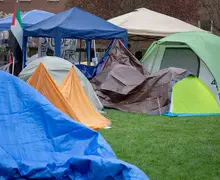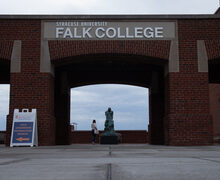SU organizations host vigil in response to anti-Asian hate
Maggie Hicks | Asst. News Editor
The Sunday night vigil on the Quad was held in response to incidents of Asian hate over the past year.
Get the latest Syracuse news delivered right to your inbox.
Subscribe to our newsletter here.
For a long time, Valrie Paynton did not have a community that she could rely on.
Paynton, who is Asian, was adopted by a white family and grew up in an environment where race wasn’t discussed much. But Paynton still experienced racist jokes and comments from the people around her.
“It was hard because I was treated like an outsider, but I also had a white family and I didn’t have an Asian culture growing up,” said Paynton, who is a sophomore at SU. “I felt like I was an imposter as an Asian person, but I also felt like an imposter as a white person.”
Paynton is one of several SU students who shared their experiences with anti-Asian racism and discussed ways to combat anti-Asian hate at a vigil on the Quad. The Sunday night vigil was held in response to incidents of Asian hate over the past year.
Roughly 3,800 incidents of racial violence against Asian Americans have been reported during the pandemic, according to Stop AAPI Hate, a nonprofit that tracks hate incidents against Asian Americans and Pacific Islanders in the U.S.
A white man shot and killed eight people — Hyun Jung Grant, Xiaojie Tan, Daoyou Feng, Paul Andre Michels, Yong Ae Yue, Suncha Kim, Delaina Ashley Yaun and Soon Chung Park — in three spas in Atlanta on March 16. Six of the victims were women of Asian descent.
The campus community has also experienced anti-Asian hate recently. Notes containing racist language targeting Chinese students were found in at least three SU buildings on March 11, and on Feb. 28 two people reportedly used anti-Asian language toward a student.
Shortly after the coronavirus hit the U.S., Kimberly Ng, a senior studying forensic science and biology, took a bus to Buffalo. During the ride, she noticed two passengers using anti-Asian slurs.
“What if I needed to sneeze? What if I needed to cough? What is going to happen to me when they know I’m two rows in front of them?” Kimberly Ng said.
Kimberly Ng has also experienced racism at SU, sometimes from professors, she said.
Tessa Pulgar, a sophomore music business major, said Asian people in the U.S. are often told that what they’re experiencing isn’t racist. Pulgar, who is Korean and Filipino, grew up in a predominantly white area.
“I was never able to put a name to the face of racism in high school,” Pulgar said. “I never realized that the way people treated me was racist.”
Crystal Ng, a first-year graduate student in the music department, is working to address discriminatory incidents that occured in one of her classes last semester. Many of the people she’s worked with or spoken to about the incidents have downplayed them, trying not to label them as acts of racism.
“Wherever you go, people are going to do anything but to identify something as racism,” Crystal Ng said. “But you need to talk about it even with your students, even with your colleagues. I think that’s where it starts.”
Students also discussed difficulties they’ve faced with being considered a “model minority” — a term that holds Asian people up as a reference for other marginalized communities and downplays the racism they experience.
Annilese Stewart, a junior earth science major, recently applied for a scholarship that provides funding and housing for students in science, technology, engineering and math who want to stay on campus and do research during the summer.
But as she was applying, she realized that Asian Americans weren’t listed as a group that could receive the scholarship.
“I feel like that was very much tied to the model minority myth about how Asian Americans don’t need help in the STEM community because Asians are good at math and science and they’re always in labs and that’s what they do,” Stewart said. “It was really disheartening to experience that through such a large systemic level.”
Kimberly Ng also mentioned the university’s recent campus climate survey, which showed that 43% of SU students, 43% of staff and 37% of faculty said they are unsatisfied with the university’s climate.
“I don’t know what else needs to be changed because our voices are not being listened to for the past four years, so that makes me concerned for future students as well,” Kimberly Ng said.
Even as SU students and the university host events to address the national rise in anti-Asian racism, several students at the vigil said there’s still more work to be done.
“Hopefully when people see this or they hear about it they will spark change within them so that way there can be more vigils, there can be more conversations, there can be more protests, whatever we need to get our voices out there,” Paynton said.
Published on April 19, 2021 at 12:09 am
Contact Maggie: [email protected] | @maggie_hickss





